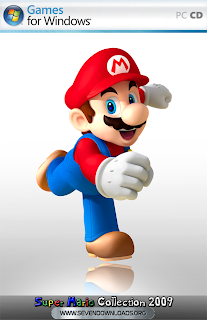 In the 2D games of the Super Mario series, gameplay primarily involves jumping on enemies and avoiding enemy attacks. In later 3D games, close quarters fights were incorporated. Intense emphasis on reaching various goals permeates the series; such goals include defeating enemies, reaching specific points, or solving puzzles. Throughout the series, collecting power-ups has been an integral part of the gameplay.In 2D games, the levels are linear, and are usually divided into different worlds, each with a certain number of hidden items and secret warp pipes. Early 2D games used levels with only one exit, then forcing the player to advance to the next sequential level. Super Mario Bros. 3 was the first game to use an overworld. In the game, levels are shown on a map, and the player can take different paths through the game. The order in which all these elements are arranged is not necessarily linear, which often allows the player to skip them or play them in different order. Super Mario World introduced levels with multiple exits. Unlike in Super Mario Bros. 3, where once a level is cleared, the player can choose the next level in the overworld, in Super Mario World, the way the player exits the level dictates which path opens to player in the overworld. Also, Super Mario World allows players to play completed levels more than once, while Super Mario Bros. 3 forces you to continue and the level will not be playable until a new game is begun.Until Super Mario 3D Land, 3D games of the series all had a non-linear, free-roaming layout. In Super Mario 64, Super Mario Sunshine and Super Mario Galaxy, an overworld connects levels in the game; more areas of the overworld and thus more levels become accessible as the game progresses. Super Mario Galaxy 2 uses a map like the one found in Super Mario World. Each course is an enclosed world in which the player is free to wander in all directions and discover the environment without time limits. The player gathers Power Stars or Shine Sprites in each course; some only appear after completing certain tasks, often hinted at by the name of the course. As more Power Stars or Shine Sprites are collected, more areas of the overworld become accessible and thus more stages are available.
In the 2D games of the Super Mario series, gameplay primarily involves jumping on enemies and avoiding enemy attacks. In later 3D games, close quarters fights were incorporated. Intense emphasis on reaching various goals permeates the series; such goals include defeating enemies, reaching specific points, or solving puzzles. Throughout the series, collecting power-ups has been an integral part of the gameplay.In 2D games, the levels are linear, and are usually divided into different worlds, each with a certain number of hidden items and secret warp pipes. Early 2D games used levels with only one exit, then forcing the player to advance to the next sequential level. Super Mario Bros. 3 was the first game to use an overworld. In the game, levels are shown on a map, and the player can take different paths through the game. The order in which all these elements are arranged is not necessarily linear, which often allows the player to skip them or play them in different order. Super Mario World introduced levels with multiple exits. Unlike in Super Mario Bros. 3, where once a level is cleared, the player can choose the next level in the overworld, in Super Mario World, the way the player exits the level dictates which path opens to player in the overworld. Also, Super Mario World allows players to play completed levels more than once, while Super Mario Bros. 3 forces you to continue and the level will not be playable until a new game is begun.Until Super Mario 3D Land, 3D games of the series all had a non-linear, free-roaming layout. In Super Mario 64, Super Mario Sunshine and Super Mario Galaxy, an overworld connects levels in the game; more areas of the overworld and thus more levels become accessible as the game progresses. Super Mario Galaxy 2 uses a map like the one found in Super Mario World. Each course is an enclosed world in which the player is free to wander in all directions and discover the environment without time limits. The player gathers Power Stars or Shine Sprites in each course; some only appear after completing certain tasks, often hinted at by the name of the course. As more Power Stars or Shine Sprites are collected, more areas of the overworld become accessible and thus more stages are available.Screenshoots :



